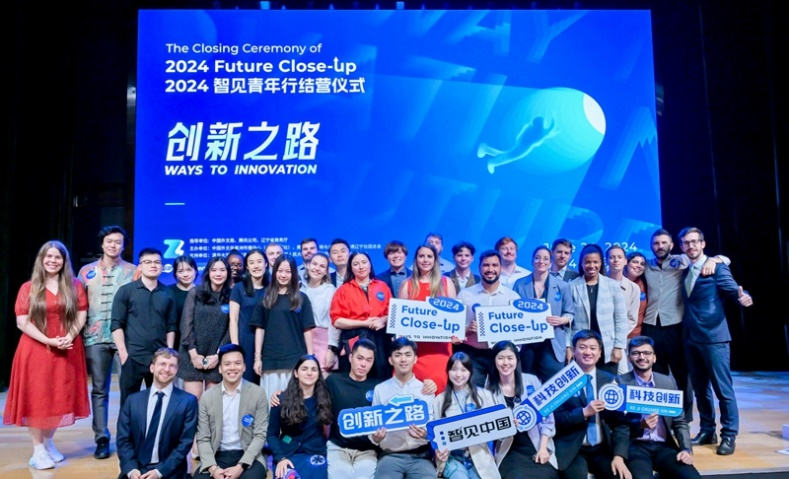2024 Future Close-Up concludes in Beijing

The 2024 Future Close-Up concludes in Beijing on June 20. [Photo/CICG]
The 2024 Future Close-Up, a high-level youth exchange program jointly hosted by the China International Communications Group (CICG) Center for the Americas, the Hong Kong Federation of Liaoning Associations, and the Marketing and Public Relations Department of Tencent, concluded in Beijing on June 20. The closing ceremony of the program also saw the release of a report titled Global Youth's Perspectives on China's Technological Innovation.
The weeklong program invited 27 young representatives from 21 countries and regions including China, the United States, Russia, Germany, Italy, Thailand, and Japan to visit Beijing, Shenyang in the northeastern province of Liaoning, and Xiong'an New Area in Hebei province for exchanges and stopovers focused on the theme "Exploring New Quality Productive Forces." This year's representatives were all influential entrepreneurs, technologists, scholars and opinion leaders.
In his opening speech, ClCG Editor-in-Chief Gao Anming said that CICG, as a professional international communications institution, has been actively promoting cultural exchange and cooperation with different countries in accordance with the requirements put forward by Chinese President Xi Jinping to build a world-class international communications institution that possesses strong comprehensive strength. The Future Close-Up program aims to help young people around the world better understand China, serving as a platform for youth to promote exchange between China and foreign countries. Today's China showcases a harmonious blend of traditional culture and modern trends, where historical heritage complements technological innovation. Gao welcomed all the attending young people from overseas to visit China more often, introducing the world's diverse civilizations to the Chinese people and sharing the essence of Chinese civilization with people everywhere. He encouraged mutual learning and exchange, emphasizing the role of youth in contributing to the progress of human civilization.
Chen Juhong, vice president of Tencent and head of Tencent's Sustainable Social Value said in her address that technology is a catalyst for innovation, while innovation acts as the adhesive for cultural integration. Through the integration of culture and innovation, Tencent aims to become a partner of and a bridge for more young people, collaborators and research teams. "Here, inspiration, creativity, responsibility and vision flow and extend, allowing the practice and application of'sustainable social value innovation' to reach broader and farther fields," she elaborated.
Erik Solheim, co-chair of the Europe Asia Center and former under-secretary-general of the United Nations, addressed the young representatives via video link, saying that "you have just spent a wonderful time in two historical cities, Beijing and Shenyang, as well as the emerging urban hub that is Xiongan New Area." These three cities are excellent examples of urban development in China.
"Seeing is believing." he continued, "China is now one of the most modernized countries in the world. I hope everyone can return to their hometowns with these wonderful memories."
Maisy Ho Chiu Ha, executive director of Shun Tak Holdings Ltd. and president of the Hong Kong Federation of Liaoning Associations, said via video link that the Future Close-up is meaningful as it allows youth from more than 20 countries and regions to explore the development of, in this case, enterprises in Liaoning, as well as local history, culture and tourist attractions. The Hong Kong Federation of Liaoning Associations, as one of the hosts of this event, aims to fully utilize the platform to tell the stories of China, including Hong Kong, to the world.
Li Yafang, president of CICG Center for the Americas, also delivered a speech and presided over the report's release. "We hope that by organizing such events, we can better leverage the role of media as a bridge and a link. Our aim is to create more platforms that enable aspiring young people to learn from each other, grow together, share opportunities, and develop collectively," Li said.
"Young people represent the future and hope of the world. We also hope that the young people can seek common ground while respecting differences, appreciate each other's strengths and jointly uphold the beauty of each civilization and the cultural diversity in the world," she added.
Youth bear the mission and responsibility of building a better world. Li encouraged program participants to raise their young voices and contribute their efforts to building a community with a shared future for humanity. "Let us jointly sow the seeds of cultural exchange and friendship, cultivate a beautiful world, and make the garden of world civilizations colorful and vibrant," Li concluded in her speech.
Zhang Di, professor and director of the Global Public Opinion Research Center at Renmin University of China, shared the center's analysis of the report. According to Zhang, the report suggests that technological innovations have penetrated into all areas of our work and life, triggering a far-reaching social change. Major breakthroughs in the field of artificial intelligence (AI), especially the rise of generative AI technology represented by large models, have brought revolutionary changes to business operations and daily life, providing a new engine for economic development.
China, as a key participant and one of the leaders in global technological innovation, is injecting new vitality into world development with its powerful strength and positive role in this transformation, Zhang said.
Siddharth Chatterjee, the UN Development System Resident Coordinator in China, explained in his address how China's investments in human capital, infrastructure and commerce have created the bedrock of the country's rise. By investing in human capital, it was able to reap the benefits of a demographic dividend. Realizing this dividend requires young people to be educated, skilled, employed and actively engaged in society. "This is fundamental. The role of young people becomes critically important as they are the key force driving society forward. The heavy responsibility for future social development will fall on the young people you represent," Chatterjee added.
Liu Qing, vice president of the China Institute of International Studies, said in his address that young people are the future of the world, and the creation of a better future needs them now more than ever.
"Today, the world is witnessing unprecedented change. Peace and development for humanity are facing emerging and alarming challenges. Overcoming these challenges and achieving common growth are part of a shared mission, one that calls for greater responsibility and commitment among the world's younger generations," Liu said.
During their travels, young representatives of the 2024 Future Close-Up unanimously expressed that the program had been a truly remarkable experience.
Head of Sourcing and Corporate Affairs at OBI Group Ricardo Manuel Barbosa Moreira said, "We got to see a little bit of the beauty of the convenience of services in China, the technology that can get anything delivered anywhere. But, at the same time, you also feel a little bit of the lives of the people here."
Richard Lorenzo Gray, president and founder of the Open Foreign Policy Initiative and an Indo-Pacific Hub Intern at USAID, visited China for the first time. "Just like anywhere else, [China] is trying to find a way, to find a meaningful way, to get the benefits of technology, key developments in areas like social media, computing and artificial intelligence," he mentioned.
Moreno Pisto, editor-in-chief of MOW, said, "I do think China is an example of innovation, of progress, of fashion... Today, it was actually the beautiful infrastructure. You can notice how much the government has worked on the development of the area."


